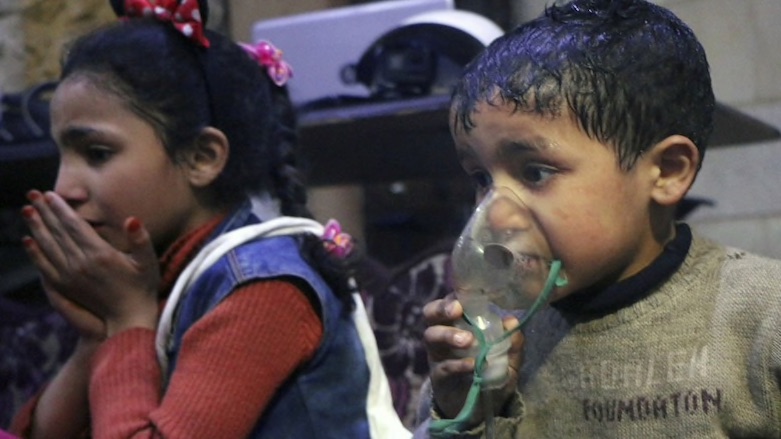Differences emerge in call between Trump, Abadi after chemical attack

WASHINGTON DC (Kurdistan 24) – Following reports that the Syrian regime used chemical weapons on Saturday against the last remaining rebel-held territory in Eastern Ghouta, US President Donald Trump spoke with Iraqi Prime Minister Haider al-Abadi in a rare Sunday exchange.
At least one important difference seemed to emerge between Washington and Baghdad: the Iraqis are not willing to condemn the Syrian attack, while the US President is outraged by it.
According to a White House readout of their talk, the discussion included the “alarming reports of possible chemical attacks near Damascus.”
Abadi’s office also released a readout of the discussion. However, the Iraqi account does not even mention the Syrian chemical attack, let alone condemn it.
The Iraqi summary of the discussion refers, instead, to “the developments in the situation in Syria.”
Iraq has close ties with Iran, which, along with Russia, is Syria’s strongest backer.
Trump expressed his fury at the Syrian use of gas as a weapon, tweeting, “Many dead, including women and children, in mindless CHEMICAL attack.”
Trump also blamed “President Putin, Russia and Iran” for “backing Animal Assad.” His tweet concludes, “Big price,” as if, perhaps, he is threatening another attack, as happened last April, when the US struck a Syrian airbase with a volley of cruise missiles following the regime’s use of sarin gas.
The White House readout of the call also explains that Trump and Abadi “discussed accelerating the campaign to defeat remnants of [the Islamic State (IS)] and the need to work together to counter other threats in the region.”
The read-out from Abadi’s office roughly matches the White House on fighting IS—but not on countering “other threats.”
“The two leaders hailed the victory over gangs that support terrorism,” Iraq’s summary states, while affirming the need to end “the remnants of the gangs” and “prevent their spread again.”
There is increasing concern about IS’ reemergence in the areas of the country that Iraq seized from Kurdish control last October. The US is reportedly urging that Iraqi Security Forces work jointly with the Kurdish Peshmerga to reestablish control there.
Significantly, Iraq’s version of the two leaders’ discussion says nothing about countering other threats in the region—which, from a US perspective, would, almost certainly, be Iran.
Rather, according to the Iraqi readout, Abadi spoke of Iraq’s “vision of regional cooperation” and its “desire for “balanced relations with all its neighbors.”
Saudi Arabia, in collaboration with the US, is working to draw Iraq away from Iran and back to the “Arab fold.” Indeed, last October, when former Secretary of State Rex Tillerson visited Riyadh, where he met Abadi, Tillerson described Iraq as an “Arab country.”
Whether the Saudis will be able to outmaneuver Iran in Iraq, remains to be seen. However, defining Iraq as an Arab country is inaccurate and disadvantages the Kurds.
Iraq’s 2005 constitution specifically does not say Iraq is Arab. Rather, it states, “Iraq is a country of many nationalities.”
Moreover, unlike Iraqi officials, who have been silent about Syria’s use of chemical weapons, Kurdish officials have expressed their grave concern that “the taboo” against using such weapons seems to be eroding.
Editing by Karzan Sulaivany
